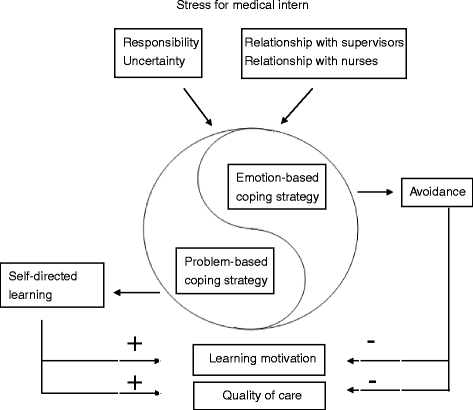The process of coping with stress by Taiwanese medical interns: a qualitative study
- PMID: 26758907
- PMCID: PMC4711106
- DOI: 10.1186/s12909-016-0534-3
The process of coping with stress by Taiwanese medical interns: a qualitative study
Abstract
Background: Internship, the transition period from medical student to junior doctor, is highly stressful for interns in the West; however, little is known about the experience of interns in coping with stress in Taiwan. This study aimed to develop a model for coping with stress among Taiwanese interns and to examine the relationship between stress and learning outcomes.
Methods: For this qualitative study, we used grounded theory methodology with theoretical sampling. We collected data through in-depth interviews and participant observations. We employed the constant comparative method to analyse the data until data saturation was achieved.
Results: The study population was 124 medical interns in a teaching hospital in northern Taiwan; 21 interns (12 males) participated. Data analysis revealed that the interns encountered stressors (such as sense of responsibility, coping with uncertainty, and interpersonal relationships) resulting from their role transition from observer to practitioner. The participants used self-directed learning and avoidance as strategies to deal with their stress.
Conclusions: A self-directed learning strategy can be beneficial for an intern's motivation to learn as well as for patient welfare. However, avoiding stressors can result in less motivation to learn and hinder the quality of care. Understanding how interns experience and cope with stress and its related outcomes can help medical educators and policy makers improve the quality of medical education by encouraging interns' self-directed learning strategy and discouraging the avoidance of stressors.
Figures

Similar articles
-
Show what you know and deal with stress yourself: a qualitative interview study of medical interns' perceptions of stress and gender.BMC Med Educ. 2014 May 17;14:96. doi: 10.1186/1472-6920-14-96. BMC Med Educ. 2014. PMID: 24884583 Free PMC article.
-
A program to help interns cope with stresses in an internal medicine residency.J Med Educ. 1988 Jul;63(7):539-47. doi: 10.1097/00001888-198807000-00005. J Med Educ. 1988. PMID: 3385752
-
Ward Rounds With or Without an Attending Physician: How Interns Learn Most Successfully.Acad Pediatr. 2016 Sep-Oct;16(7):638-44. doi: 10.1016/j.acap.2016.05.149. Epub 2016 Jun 6. Acad Pediatr. 2016. PMID: 27283038
-
Learners as teachers: the conflicting roles of medical residents.J Gen Intern Med. 1995 Nov;10(11):615-23. doi: 10.1007/BF02602745. J Gen Intern Med. 1995. PMID: 8583264
-
Using an Entrustable Professional Activity to Assess Consultation Requests Called on an Internal Medicine Teaching Service.MedEdPORTAL. 2019 Nov 22;15:10854. doi: 10.15766/mep_2374-8265.10854. MedEdPORTAL. 2019. PMID: 31934616 Free PMC article. Review.
Cited by
-
Beyond the struggles: a scoping review on the transition to undergraduate clinical training.Med Educ. 2019 Jun;53(6):559-570. doi: 10.1111/medu.13883. Epub 2019 Apr 23. Med Educ. 2019. PMID: 31012141 Free PMC article.
-
A prospective study of the factors associated with life quality during medical internship.PLoS One. 2019 Aug 12;14(8):e0220608. doi: 10.1371/journal.pone.0220608. eCollection 2019. PLoS One. 2019. PMID: 31404080 Free PMC article.
-
The challenges of medical students in their internship : a qualitative study from Iran.BMC Res Notes. 2024 Sep 2;17(1):241. doi: 10.1186/s13104-024-06883-9. BMC Res Notes. 2024. PMID: 39223655 Free PMC article.
-
Prevalence and Pattern of Phantom Ringing and Phantom Vibration among Medical Interns and their Relationship with Smartphone Use and Perceived Stress.Indian J Psychol Med. 2018 Sep-Oct;40(5):440-445. doi: 10.4103/IJPSYM.IJPSYM_141_18. Indian J Psychol Med. 2018. PMID: 30275619 Free PMC article.
-
Students' social networks are diverse, dynamic and deliberate when transitioning to clinical training.Med Educ. 2021 Mar;55(3):376-386. doi: 10.1111/medu.14382. Epub 2020 Oct 13. Med Educ. 2021. PMID: 32955741 Free PMC article.
References
Publication types
MeSH terms
LinkOut - more resources
Full Text Sources
Other Literature Sources

